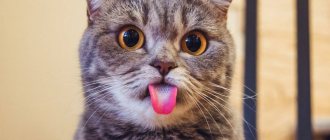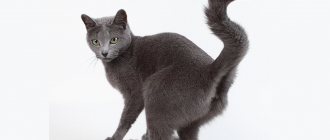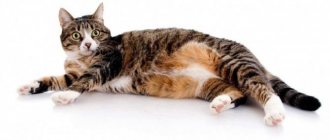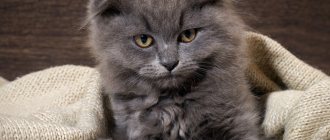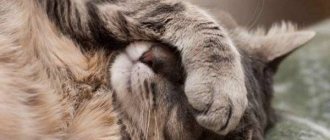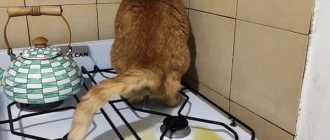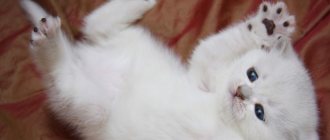Many pet owners have probably noticed more than once a strange thing when a cat sticks out the tip of its tongue, bites it and in this position begins to walk around the apartment. This is a very funny picture, but not everyone thinks so.
Some owners literally panic because of this behavior of the animal and urgently rush to get an appointment with a veterinarian. Below we detail why cats stick out their tongues and how it relates to their health.
The cat constantly shows his tongue
The cat sleeps with its tongue hanging out
Cats tend to do all sorts of strange things that are both cute and mysterious. The behavior you'll read about is quite common!
Cats are self-sufficient and proud animals. However, sometimes they do something so funny and crazy that their serious image inevitably suffers. These situations can make everyone laugh, and one of them is forgetting to hide your tongue in your mouth, usually while sleeping. This phenomenon even has its own hashtag: #catsleepingtongue. Find out why a cat sleeps with its tongue hanging out!
Possible diseases
Why a cat tramples its paws: the main reasons and what it means
In some cases, a tongue falling out of the mouth is a reason to worry.
How does an animal behave if it gets sick?
Respiratory diseases
Sometimes cats stick out their tongues and breathe like dogs due to diseases such as rhinitis, ARVI, tracheitis, pneumonia and bronchitis. The main signs of the disease are difficulty breathing, coughing, wheezing when inhaling and exhaling, wheezing, lack of appetite, and nasal discharge. Temperature may also rise and apathy may appear.
Poisoning
Cats may sit with their tongue hanging out if their body is intoxicated. Animals may experience symptoms such as disturbances in the functioning of the respiratory tract and coordination, excessive salivation, vomiting, diarrhea, tremors, dilated pupils, and convulsive muscle contractions. Usually in this state the cat feels increased anxiety or complete apathy.
Infections
A protruding tongue can be observed in cats in the case of infectious diseases such as rhinotracheitis, chlamydia and calcivirosis. In this case, animals may exhibit the same symptoms as in the case of respiratory disease. In addition, pets may have bowel movements and purulent discharge from the nose and eyes. The infection can also cause swelling in the mouth, causing the tongue to fall out of the mouth.
Important! If the cat begins to show aggression, it has profuse salivation, an open mouth and bulging eyes, then this may indicate the presence of rabies.
In the case of an infectious disease, the animal also behaves strangely
Tumors
Oncology of the oral cavity is one of the most dangerous causes of a protruding tongue. If there is plaque, bleeding, bad breath, a hoarse voice, problems chewing or swallowing, or painful mouth ulcers, your pet needs immediate medical attention.
Note! A cat can stick out its tongue not only due to a malignant tumor, but also in the case of polyps located in the oral cavity.
Heart failure
Such a serious illness as heart failure is often accompanied by pulmonary edema. This causes the cat to try to breathe from its belly rather than from its chest, with its tongue usually sticking out. Signs of this disease are a weak appetite or its complete absence, the tongue and gums acquire a blue tint, a distinct hoarseness appears when breathing, the heartbeat quickens, coordination of movements is impaired, the work of the hind legs is not always synchronous, some of the receptors may be paralyzed. Cats may also stick out their tongue due to conditions such as ischemia, angina, and hypertension.
Kidney failure
Sometimes you can observe that a cat sticks out its tongue and at the same time breathes very heavily. This usually happens when there is a problem with the kidneys. Signs of kidney failure are the following symptoms: unpleasant odor from the mouth (with an ammonia taste), vomiting and diarrhea, mucous membranes acquire a yellow tint, deterioration in the condition of the coat and skin, weight loss. The cat may also experience extreme thirst, frequent urination, blurred vision, and severe swelling in the abdomen.
Foreign object in the respiratory organs
An animal that gets too playful may swallow a small toy.
A sticking out tongue is a common reaction to such a problem. If a foreign object is in the respiratory tract, the cat usually begins to actively sneeze, cough (in some cases with blood), her eyes water and her breathing is impaired (heavy, frequent and noisy inhalations and exhalations).
Swelling of the larynx due to allergies
Sometimes a similar reaction of an animal can be observed in case of allergies. The most common allergens are medications or food consumed. As a result, swelling of the larynx may occur. Symptoms include enlarged palate and tonsils, respiratory problems (infrequent, deep and slow breaths may be accompanied by coughing), slow heartbeat, problems swallowing, hoarse voice and restlessness.
Jaw injury
If there is no appetite, excessive salivation and prolapse of the tongue, the cat should be checked for a dislocated jaw. In case of bilateral dislocation, the pet is deprived of the ability to close its mouth. If a unilateral dislocation occurs, then the animal’s mouth, as a rule, is slightly open, with the jaw noticeably protruding to the side.
Oral inflammation
Sometimes cats have problems with breathing and oral control in cases of stomatitis and gingivitis. The animal's tongue, being behind the teeth, can touch painful ulcers (stomatitis) or inflamed gums (gingivitis). The only thing a cat can do to alleviate the discomfort is stick out its tongue. With stomatitis, animals experience symptoms such as an unpleasant odor from the mouth, the inability to chew food normally, excessive salivation, the formation of ulcers in the mouth, and sometimes the body temperature may rise.
Note! In the case of gingivitis, the symptoms are almost completely the same as dental ones (with the exception of ulcers).
Inflammation in the oral cavity can greatly bother a cat.
Brain disorders
In cases of disturbances in the activity of parts of the brain responsible for respiratory and other processes, cats may experience problems with tongue control, which are caused by difficulty in inhaling and exhaling.
Why does a cat sleep with its tongue hanging out?
- The most common reason why a cat hangs its tongue is a state of complete relaxation. This is a universal phenomenon for sleeping or napping cats. This is the effect of relaxing the jaw.
- Some experts interpret the tongue sticking out as a sign of complete bliss for the cat. Of course there is no need to worry. A relaxed cat is a lucky cat. And a happy cat is a joy to its owners!
Tongue protrusion is especially common in cats that have missing front teeth. So, if you have an old cat at home, then you are probably more likely than other owners to notice the tip of his tongue sticking out.
Features of cat physiology
- In hot weather, the animal's heat exchange may be disrupted. This is what the sticking out tongue says.
- If this behavior is accompanied by aggression and increased salivation, this indicates the presence of rabies or another serious infectious disease.
- The organ does not fit in the mouth. This may be a feature, or it may indicate the presence of oral diseases. This could be damage to the mouth, jaw or teeth.
- Mental retardation from birth. In such inferior kittens, which could have been bred in the process of crossing several breeds, this is an innate feature.
- Expression of fear at sharp, loud, unpleasant sounds. Many cats react this way to tape coming off. And for some others, such a reaction is observed with the cotton that is heard when champagne is opened.
- This unusual behavior may be quite normal for certain breeds of cats. Most often, this is how four-legged friends show their devotion and trust in their owner. However, some express delight in this way.
- Impaired sense of smell. The pet sticks out its tongue because it cannot catch some odors. And this causes him some inconvenience.
- The onset of labor, which is accompanied by strong nervous tension and intense licking of fur. Due to excitement and unpleasant sensations, the cat simply forgets about this organ, and it involuntarily falls out of its mouth.
- A bone stuck in the mouth, teeth or even throat. This is usually accompanied by certain sounds: coughing or snorting. The cat may also try to pick at its mouth with its paw. If you notice such symptoms, you should immediately contact a veterinary clinic.
- This is how pets can react to dogs. Especially if they have already had unpleasant experiences with these animals.
For what reasons does a cat stick out the tip of its tongue?
Sometimes a cat sticks out the tip of its tongue due to health problems. What you should pay attention to?
- A cat may stick out its tongue when food remains stuck between its teeth.
- It will react in a similar way to any gum disease , infection, canker sores or tooth decay. The tongue touching the sore teeth increases the pain. The more discomfort a cat feels, the less likely it is to close its mouth. Remember that your cat's teeth need to be brushed and constantly monitored! Additional signs that something bad is happening: Cats are drooling and lacking appetite.
- A cat may stick out its tongue when it is having trouble breathing. If the shortness of breath is caused by too much activity during play, you should stop it and give the cat a rest. Don't make your cat so tired. However, if the situation is not related to activity, you should take your pet to the vet!
- If the protruding tongue is swollen, it may be due to a splinter or an allergic reaction , in which case a visit to the veterinarian's office will be required. It could also be poisoning, so don't delay visiting your doctor!
Remember!
Never try to diagnose your pet yourself! Leave it to a professional veterinarian.
- On hot days, shortness of breath can be caused by overheating. Heatstroke is very dangerous, so in this case you should take action. Immediately moving the cat into the shade and gradually cooling the body with warm water is the first thing we should do.
- If you have not noticed this behavior in your pet before, but now it is appearing more often, it is worth checking your pet's health. Any sudden changes in the purring cat's behavior and appearance should attract our attention. A sticking out tongue could indicate an abscess or even a tumor in the mouth.
- In older cats, constantly forgetting to keep their tongue in their mouth may be a sign of dementia.
Diseases that may cause a cat to stick out its tongue
- Serious damage to the jaw
- Insufficiency of the cardiovascular system
- Disruption of natural processes occurring in the brain
- Mental disorder, nervous overstrain, severe fear
- Brain injury
- Increased body temperature
- Muscle atrophy
- Dental problems
- Breathing problems
- Disorders of the salivary glands
- Recovery from anesthesia. The cat will be able to completely close its mouth only a day after it.
- Sores or ulcers in the mouth.
- Stomach-related diseases: vomiting, diarrhea. The cause may be poisoning.
The cat sleeps with the tip of his tongue sticking out
First, make sure it's just relaxation. Unless your cat is sick, tongue protrusion does not pose a threat to his health. This is a natural behavior that will likely last no more than a few minutes and will bring a small smile to your family's face. However, if a cat cannot or does not want to close its mouth, this is unfortunate because it may indicate health problems.
Make sure that none of the above cases that may indicate health problems are related to your pet.
When should you not worry?
Animals are able to distinguish odors using taste buds. A protruding tongue may be a sign of your pet's weakened sense of smell.
When raising a kitten, people watch it and know that cats don’t just stick out their tongues. There are a number of reasons why this can happen without harm to the pet:
This phenomenon can occur in animals that are too relaxed in their sleep.
- Scattering. After washing, kittens and adult cats freeze and sit motionless for up to 20 minutes. At the same time, they bite their tongues, forgetting to hide them.
- Relaxation. When an animal relaxes during restful sleep, all muscles become softer, including the tongue. It doesn't fit in the mouth and falls out.
- Fear. In a stressful situation, cats, like dogs, tend to breathe heavily with their tongue hanging out. Thus, the animal facilitates access of air to the lungs and saturation of the body with oxygen.
- Heat. Due to the lack of sweat glands, cats and dogs use their tongue to cool themselves. Having noticed this signal, you need to place the animal in a cool room to prevent heat stroke.
Features of the structure of the cat’s oral cavity and its tongue
The oral cavity of representatives of this family is formed:
The tongue, which is an elongated movable organ located at the bottom of the mouth, with its base attached to the body of the hyoid bone, and the free tip located in the anterior zone of the jaw. On its surface there are papillae - special mushroom-shaped structures with tiny holes or pores leading to taste buds. The tongue is predominantly formed by bundles of muscles, which are interspersed with hard connective and fatty tissue. It is penetrated by many blood vessels. It is surrounded by the openings of the ducts of the salivary glands, through which saliva enters the oral cavity. This organ is responsible for many functions: moving food in the mouth, helping with chewing and swallowing, delivering liquid to the oral cavity when drinking, determining the taste of food through taste buds, regulating body temperature (by moving over the tongue in the back and front directions, the air is cooled , evaporating saliva), cleaning the fur.
Teeth located along the outer boundaries of the oral cavity, the upper of which are fixed in the maxillary bone, and the lower ones in the mandibular bone. Each of these bone formations consists of pulp, dentin, enamel and cementum. The tooth root is held in the bony socket of the jaw by periodontal ligaments of connective tissue. One tooth may have one or more roots. Kittens have 26 milk units, adult animals have 30 permanent ones: 12 sharp incisors, 4 long canines, 10 premolars, 4 molars. Functions of teeth: grinding and chewing food. The incisors are responsible for biting off food, the canines are for piercing and tearing it, the premolars are for rubbing, grinding and chewing food, and the molars are for final chewing.
- The mouth, used for receiving food and its primary processing. It is the gateway to the gastrointestinal tract. A cat's mouth is located in the lower front part of the snout between the maxillary and mandibular bones. It is formed by the space behind the teeth and gums, lips and cheeks. The main part of the mouth is bounded above by the hard and soft palate, on the sides and in front by the teeth and lips, and below by the tongue and adjacent tissues. The mouth is responsible for the production and secretion of saliva, which moistens food and helps form portions of it. It contains enzymes that help digest food and cleanses the tongue. Through the mouth, additional oxygen is supplied to the cat's respiratory system if necessary.
- Membranous mucous membrane. The upper part of the oral cavity is the palate. Its anterior part, which is formed by mucous-covered bone, is the hard palate, separating the oral cavity and nasal passages. The soft posterior region is the soft palate formed by the flexible fold of mucous membrane between the back of the mouth and nasal cavity.
- The lips, with the help of which the animal picks up food, throwing it into the oral cavity.
- Cheeks.
- Numerous small glands, including the sublingual salivary gland, which is located under the tongue.
Diseases that cause the tip of the tongue to protrude in cats
You shouldn't always be touched by a pet's tongue sticking out of its mouth. We need to see if there is anything else unusual in the behavior.
If additional symptoms are detected, then the cat may have the following diseases:
- Foreign object in the respiratory tract. The pet may sneeze and cough. Liquid leaks from the nose and eyes, breathing is intermittent, rapid, noisy.
- Allergic swelling of the larynx. The pet is breathing heavily, the tonsils and palate are swollen.
- Poisoning: the mouth is open, drooling profusely. The cat is depressed, sitting or lying, vomiting and diarrhea occurs.
- Heart failure: the cat breathes through its belly due to pulmonary edema developing. Additional symptoms: cyanosis of the tongue and mucous membranes, shortness of breath, refusal to eat. At the moments of exhalation, wheezing is heard, the heartbeat is rapid, coordination of movements is impaired, and paresis of the paws occurs.
- Kidney failure: shortness of breath occurs, the smell of urine is felt from the mouth. Additional signs are thirst, polyuria, vomiting, diarrhea. The mucous membranes acquire a yellowish tint. The cat is exhausted, does not eat well, and its fur does not look neat. In severe cases, the abdomen swells and vision weakens.
- Stomatitis or Gingivitis - touching the tongue to the teeth or mucous membranes of the mouth is painful, so the cat tries to remove the irritating organ away. Additional signs are halitosis (stench from the mouth), ulcers on the tongue, excessive drooling. It hurts your pet to chew.
- Respiratory diseases: bronchitis, rhinitis, pneumonia. , sniffles, the nose constantly runs, crusts form, the passages for air are blocked, which the cat does not inhale, but is forced to swallow. Conjunctivitis occurs with mucous or purulent discharge. The most common cause is a group of diseases called cat flu.
- Dislocations and fractures of the jaw. With one-sided damage, the muzzle is distorted. Bilateral pathology is characterized by the inability to close the mouth.
- Tumors in the mouth or nose, benign or malignant. A stench comes from the mouth, erosions, ulcers, and polyps are found. Meowing is hoarse, chewing food is painful.
- Systemic brain damage. Additional signs are strabismus, impaired coordination of movements, paralysis.
Physiological reasons
Sometimes a protruding tongue is explained by simple physiology. In these cases there is nothing to worry about.
Washing
You can often see a cat sitting with its tongue hanging out after a long wash. Perhaps this is how she relaxes her muscles or meditates.
Relaxation
When a cat sleeps, the muscles of the tongue are relaxed and it naturally lengthens. Therefore, the animal’s mouth is half open and the tip of this muscular organ protrudes from it.
Stressful situations
Many animals, when in an excited state, are characterized by rapid breathing. The protruding tongue facilitates the passage of oxygen to the respiratory tract.
Overheat
Both dogs and cats, when they are hot, breathe heavily with their tongues hanging out. And this is a physiological norm - this is how they cool down. After all, they have practically no sweat glands; a small amount of them is located only on the pads of their paws.
Sexual rut
A protruding tongue can be seen in a male when he is excitedly “courting” a female, and this is also considered a physiological norm.
Childbirth
During the birth of kittens, the cat breathes heavily, constantly licks itself, forgetting to remove its tongue. At this point in her life, this is an absolutely normal sign, as she is very tense, tired, and may have a fever.
Nausea
Some pets get motion sickness from riding in a car. A sign of impending nausea and vomiting can be the tip of the tongue sticking out of the mouth.
The same situation occurs with a pet after anesthesia, for example, after sterilization or castration. But here general muscle weakness joins nausea.
Sounds
A certain frequency of vibration of sound waves causes reflex yawning and the effect of protruding the tongue in cats. For example, if you run your finger over the teeth of a fine-toothed comb or tear off some tape.
Infectious diseases
Serious infectious diseases, such as rhinotracheitis, calcivirosis, are accompanied by fever, sneezing and runny nose, which causes protrusion. Calicievirosis is distinguished by ulcers on the animal's tongue and discharge from the nose. Ulcers in the mouth, salivation, and nasal discharge accompany the disease rhinotracheitis. Flat-faced cat breeds – Persians – are especially susceptible to it.
Stress
In stressful situations, cats often begin to actively lick themselves or simply stick out their tongues and breathe like a dog. This is natural behavior of the animal.
Functional brain disorders
Cats are prone to nervous disorders. Alarming symptoms include: convulsions, strabismus, protruding, urinary and fecal incontinence. A fallen tip is also one of the signs of a pet's imminent death.
Malocclusion
Not all cats have a correct bite from birth. Some breeds have structural features of the lower jaw, for example, it can protrude forward. This leads to the fact that the teeth do not cover the tongue, and it can easily penetrate outward.
Note! Treatment of a problem bite will be needed if the pet experiences serious discomfort due to an incorrect tongue arcade.
Inflammation in the mouth
Inflammatory processes in the mouth, its mucous membrane, can push the purr to stick out its tongue to relieve pain. Such symptoms occur with stomatitis.
Abyssinian cats are susceptible to gingivitis.
The main cause of gingivitis is poor diet and lack of oral hygiene.
To avoid oral problems, cats need to have their teeth brushed every one to two weeks. The kitten must be accustomed to this procedure after three to four months.
What to do
If you suspect that the kitten has a specific facial expression because it is sick, you need to visit a veterinarian and strictly follow his instructions. Don’t worry that you will bother the specialist unnecessarily. An examination is never superfluous, and it is much better to know for sure that everything is fine with the cat than to cause the disease to develop.
We figured out why cats stick out the tip of their tongue, and now you can easily understand when a tongue sticking out causes a smile, and when it is a menacing symptom. If you have any doubts, it is better to see a veterinarian.
Source
Thermoregulation
The cat's tongue is not only part of the digestive system, but also a natural thermometer and temperature regulator.
With its help, the animal more accurately determines the temperature of the environment and food. With food, everything is simple: if it is hotter than it should be, the animal will simply wait. Air temperature is a little more complicated. The surface of the skin of cats is almost completely covered with hair, so they are not able to correctly immediately assess whether they are hot or cold. In case of overheating, the skin with hair also cannot act as a thermostat: the area of evaporation to reduce body temperature is insignificant. There is a need to increase the area of evaporation, which is why cats stick out their tongues, lie down and relax at the same time, so that the fur interferes less with the cooling process. This reaction also occurs in cases of overexcitement or stress: often our four-legged pets lie down while traveling, breathing heavily, hanging their tongues, sometimes even drooling. From the outside it seems that the cat is very ill, but in fact this is natural thermoregulation in action.
Source
